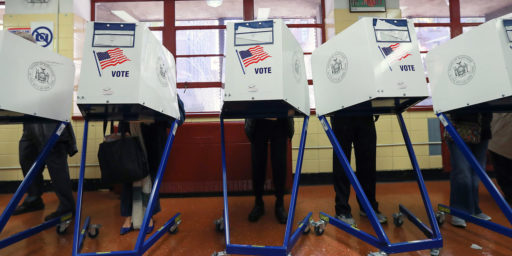Associated Press Reporters Reprimanded For Using Twitter To Send Out Breaking News
The Associated Press is trying to fight Twitter rather than engage it.
 In what what seems to me like an incredible example of a Luddite mentality, the Associated Press is reprimanding reporters for sending out breaking news over their Twitter accounts:
In what what seems to me like an incredible example of a Luddite mentality, the Associated Press is reprimanding reporters for sending out breaking news over their Twitter accounts:
A high importance e-mail went out to Associated Press employees early Wednesday morning to remind them of Twitter rules in the wake of staff arrests at yesterday’s local protests. “In relation to AP staff being taken into custody at the Occupy Wall Street story, we’ve had a breakdown in staff sticking to policies around social media and everyone needs to get with their folks now to tell them to knock it off,” went one version of the e-mail sent from on high, as obtained by Daily Intel. “We have had staff tweet – BEFORE THE MATERIAL WAS ON THE WIRE – that staff were arrested.”
The official rules note, “Don’t break news that we haven’t published, no matter the format.” (Reuters spells out the same idea plainly in their handbook: “Don’t scoop the wire.”) Instead of getting “caught in the moment,” the AP’s freewheeling tweeters are urged in the e-mail to run “sensitive official AP business” through editors and corporate communications. The AP’s social media guidelines were recently updated to insist, “Retweets, like tweets, should not be written in a way that looks like you’re expressing a personal opinion on the issues of the day.”
It’s somewhat understandable why the AP would have this policy, after all they make their money selling news stories to their subscriber papers and other media outlets and the “Breaking News” banner from the Associated Press is somewhat famous in journalism. Nonetheless, I have to agree with the point that Patrick Thornton makes in his post about this new rule:
If Twitter is faster than the wire, maybe Twitter is simply a better breaking news platform. The issue that these policies cause is that someone else will break the news first. Once the news is broken it will be retweeted, and the reporters that broke the news first on Twitter will get all the retweets. If the AP is going to require its reporters to wait until something is on the wire first to link to, AP reporters will fall behind, and people will turn less and less to AP reporters and content for breaking news.
There is nothing wrong with breaking news on Twitter and then sending out additional tweets with links to more info in the future. This doesn’t have to be an either-or proposition. Break the news on Twitter, write a short wire post and then send out another tweet with more info. Simple.
Moreover, if AP’s reporters become known as a go-to source for breaking news on Twitter, that is only going to serve to enhance the organizations reputation. The actual cost to their business model, moreover, would seem to be minimal. Newspapers are still going to want to publish a story on their websites, not a Tweet, and that requires more detail than can be put in a 140 characters to begin with.
Thornton’s other point is completely correct as well. Over the past year or so, it’s become very clear that Twitter is *the* place for breaking news. People first learned about the death of Osama bin Laden on Twitter, the same for the death of Michael Jackson, and it was via Twitter that Herman Cain’s Libya gaffe video went viral so quickly the other day. That’s the new world of breaking news, and it seems like it would be better for the AP to embrace it rather than try to fight it.






-.. . .– . -.– + -.. . ..-. . .- – … + – .-. ..- — .- -.
I’m just wondering if breaking the news via Twitter might cause any compromise of accuracy because of the haste involved in getting a news item out.
“Let’s not print this till it we are sure we know it’s right.” Chicago Tribune Nov. 3,1948
Good points. AP will have to adjust…but, like every large organization, it will take some time for the common sense to trickle up to the editors.
The AP has a point. They don’t pay people to break news on their personal Twitter accounts.
The only way it would help AP is if they had an account and employees used that channel to break news.
@Peter:
As Thornton points out, the news is still going to “break” on Twitter whether the AP likes it or not. By prohibiting their reporters from participating in that process, they are actually diminishing the value of their brand.
I don’t think they’re just worried about the value of their brands. I think they’re trying to preserve their copyrights.
@jan:
Short answer: yes.
Longer answer: depends… In any sort of breaking news coverage, there is a high probability of getting the news, at least in part, wrong. The bigger issue with Twitter, is not so much when to publish, but aspects of the platform which tend to allow incorrect information to circulate long after new information is available.
In defense of news agencies, beyond worrying about their competition, many are also concerned about getting “scooped” by citizens or word of mouth, which can, at times, be even less accurate.